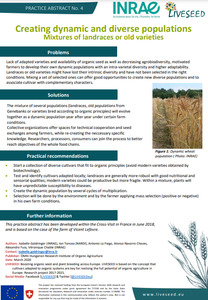{Tool} Creating dynamic and diverse populations. Mixtures of landraces or old varieties (Liveseed Practice Abstract). Creator(s): Goldringer, I.; toncea, I.; Lo Fiego, A.; Navarro Chaves, A.; Fuss, A. and Chable, Véronique. Issuing Organisation(s): INRAE - National Research Institute for Agriculture, Food and Environment, NARDI - National Agricultural Research and Development Institute. Liveseed Practice Abstract, no. 4. (2020)
|
PDF
- English
(Creating dynamic and diverse populations. Mixtures of landraces or old varieties)
1MB | |
![[thumbnail of 2022-07-26 21_16_50-PowerPoint Presentation.png]](/37869/3.hassmallThumbnailVersion/2022-07-26%2021_16_50-PowerPoint%20Presentation.png)  Preview |
Image (PNG)
- Cover Image
- English
168kB |
Document available online at: https://www.liveseed.eu/wp-content/uploads/2020/03/PA4_Creating-dynamic-and-diverse-populations.pdf
Summary in the original language of the document
Practical Recommendations: Start a collection of diverse cultivars that fit to organic principles (avoid modern varieties obtained by biotechnology). Test and identify cultivars adapted locally; landraces are generally more robust with good nutritional and sensorial qualities; modern varieties could be productive but more fragile. Within a mixture, plants will have unpredictable susceptibility to diseases. Create the dynamic population by several cycles of multiplication. Selection will be done by the environment and by the farmer applying mass selection (positive or negative) in his own farm conditions.
| EPrint Type: | Practice tool |
|---|---|
| What problem does the tool address?: | Lack of adapted varieties and availability of organic seed as well as decreasing agrobiodiversity, motivated farmers to develop their own dynamic populations with an intra-varietal diversity and higher adaptability. Landraces or old varieties might have lost their intrinsic diversity and have not been selected in the right conditions. Mixing a set of selected ones can offer good opportunities to create new diverse populations and to associate cultivar with complementary characters. |
| What solution does the tool offer?: | The mixture of several populations (landraces, old populations from Genebanks or varieties bred according to organic principles) will evolve together as a dynamic population year after year under certain farm conditions. Collective organizations offer spaces for technical cooperation and seed exchanges among farmers, while re-creating the neccessary specific knowledge. Researchers, processors, consumers can join the process to better reach objectives of the whole food chains. |
| Country: | France |
| Type of Practice Tool: | Practice abstracts |
| Keywords: | seeds, varieties |
| Agrovoc keywords: | Language Value URI English seeds http://aims.fao.org/aos/agrovoc/c_6946 English varieties http://aims.fao.org/aos/agrovoc/c_8157 |
| Subjects: | Crop husbandry > Breeding, genetics and propagation |
| Research affiliation: | European Union > Horizon 2020 > Liveseed European Union > Horizon 2020 > Liveseed > Liveseed tools France > INRA - Institut National de la Recherche Agronomique Romania > Other organizations Romania European Union > Organic Farm Knowledge |
| Horizon Europe or H2020 Grant Agreement Number: | 727230 |
| Related Links: | https://organic-farmknowledge.org/tool/37869, https://www.inrae.fr, https://orgprints.org/37869 |
| Project ID: | ofk |
| Deposited By: | Ortolani, Dr. Livia |
| ID Code: | 37869 |
| Deposited On: | 12 Apr 2020 18:34 |
| Last Modified: | 02 May 2024 10:32 |
| Document Language: | English |
| Status: | Published |
Repository Staff Only: item control page

 Download Statistics
Download Statistics Download Statistics
Download Statistics
